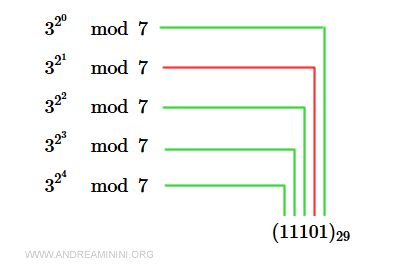Modular Exponentiation
Modular Exponentiatio>
To compute modular exponentiation using congruences, $$ a^m \mod n $$, I can follow this approach:
- Compute all powers \( a^x \) where \( x = 2^k \) and \( x < m \).
- Express the exponent \( m \) in binary (base 2).
- Identify the product of the powers \( a^x \) that correspond to the 1s in the binary representation of \( m \).
- Compute the powers and their product while reducing the intermediate results modulo \( n \) at each step.
The final result is \( a^m \) modulo \( n \).
A Practical Example
Let's compute \( a^m \) with \( a = 3 \) and \( m = 29 \) modulo 7:
$$ 3^{29} \mod 7 $$
First, I compute all powers where the exponent is \( 2^k \) and less than \( m = 29 \):
$$ 3^{2^0} \mod 7 \text{ since } 2^0=1 < 29$$
$$ 3^{2^1} \mod 7 \text{ since } 2^1=2 < 29 $$
$$ 3^{2^2} \mod 7 \text{ since } 2^2=4 < 29 $$
$$ 3^{2^3} \mod 7 \text{ since } 2^3=8 < 29 $$
$$ 3^{2^4} \mod 7 \text{ since } 2^4=16 < 29 $$
I stop here because \( 2^5 = 32 > 29 \).
This gives the following congruences:
$$ 3^{2^0} \mod 7 $$
$$ 3^{2^1} \mod 7 $$
$$ 3^{2^2} \mod 7 $$
$$ 3^{2^3} \mod 7 $$
$$ 3^{2^4} \mod 7 $$
Next, I write \( m = 29 \) in binary:
$$ (11101)_{29} $$
Each binary digit (starting from the right) corresponds to a power of \( a \).

Now, I form a product using only the powers associated with the 1s in the binary representation:
$$ 3^{2^4} \cdot 3^{2^3} \cdot 3^{2^2} \cdot 3^{2^0} \mod 7 $$
Computing the powers:
$$ 3^{16} \cdot 3^8 \cdot 3^4 \cdot 3^1 \mod 7 $$
$$ 43046721 \cdot 6561 \cdot 81 \cdot 3 \mod 7 $$
Note: If any power is still too large to compute directly, I can simplify it or use the same algorithm recursively. For example, \( 3^{16} \) is difficult to compute directly, but I can break it down as follows: $$ 3^{16} = (3^4)^4 \mod 7 $$ $$ 3^{16} = 81^4 \mod 7$$ Since \( 81 \) divided by 7 leaves a remainder of 4, I rewrite the equation modulo 7: $$ 3^{16} = 4^4 \mod 7$$ $$ 3^{16} = 16^2 \mod 7$$ Since \( 16 \) divided by 7 leaves a remainder of 2, I simplify further: $$ 3^{16} = 2^2 \mod 7$$ $$ 3^{16} = 4 \mod 7$$ This allows me to express \( 3^{16} \) directly in modulo 7 without calculating its decimal value.
Now, I reduce all values modulo 7:
$$ 4 \cdot 2 \cdot 4 \cdot 3 \mod 7 $$
I simplify step by step, reducing intermediate results modulo 7 whenever they exceed 7:
$$ 4 \cdot 2 \cdot 4 \cdot 3 \mod 7 $$
$$ 1 \cdot 4 \cdot 3 \mod 7 $$
$$ 4 \cdot 3 \mod 7 $$
$$ 5 \mod 7 $$
This gives the final result:
$$ 3^{29} \mod 7 $$
$$ 5 \mod 7 $$
Thus, \( 3^{29} \) modulo 7 is equivalent to 5 modulo 7:
$$ 3^{29} \equiv 5 \mod 7 $$
And that's it.
